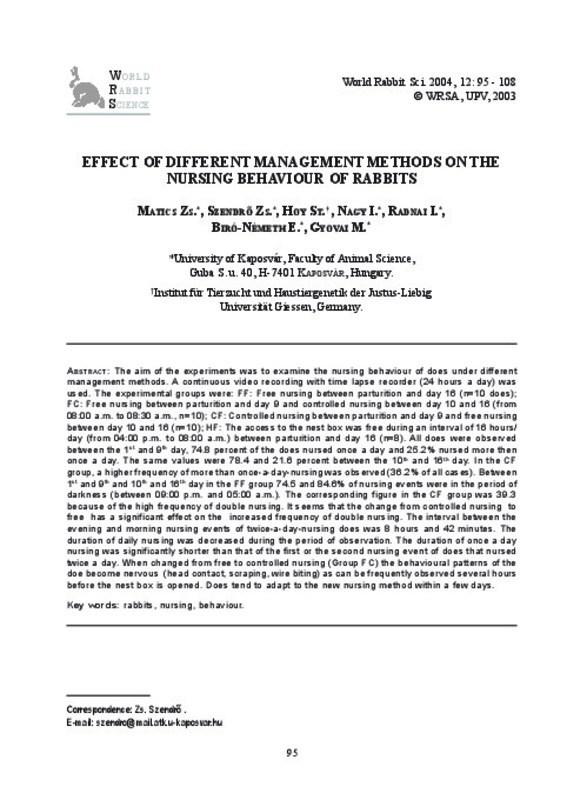JavaScript is disabled for your browser. Some features of this site may not work without it.
Buscar en RiuNet
Listar
Mi cuenta
Estadísticas
Ayuda RiuNet
Admin. UPV
Effect of different management methods on the nursing behaviour of rabbits
Mostrar el registro sencillo del ítem
Ficheros en el ítem
| dc.contributor.author | Matics, ZS.
|
|
| dc.contributor.author | Szendrõ, ZS.
|
|
| dc.contributor.author | Hoy, ST.
|
|
| dc.contributor.author | Nagy, I.
|
|
| dc.contributor.author | Radnai, I.
|
|
| dc.contributor.author | Biró-Németh, E.
|
|
| dc.contributor.author | GYOVAI, M.
|
|
| dc.date.accessioned | 2011-02-21T10:23:06Z | |
| dc.date.available | 2011-02-21T10:23:06Z | |
| dc.date.issued | 2004 | |
| dc.identifier.issn | 1257-5011 | |
| dc.identifier.uri | http://hdl.handle.net/10251/9923 | |
| dc.description.abstract | [EN] The aim of the experiments was to examine the nursing behaviour of does under different management methods. A continuous video recording with time lapse recorder (24 hours a day) was used. The experimental groups were: FF: Free nursing between parturition and day 16 (n=10 does); FC: Free nursing between parturition and day 9 and controlled nursing between day 10 and 16 (from 08:00 a.m. to 08:30 a.m., n=10); CF: Controlled nursing between parturition and day 9 and free nursing between day 10 and 16 (n=10); HF: The access to the nest box was free during an interval of 16 hours/ day (from 04:00 p.m. to 08:00 a.m.) between parturition and day 16 (n=8). All does were observed between the 1st and 9th day, 74.8 percent of the does nursed once a day and 25.2% nursed more then once a day. The same values were 78.4 and 21.6 percent between the 10th and 16th day. In the CF group, a higher frequency of more than once-a-day-nursing was observed (36.2% of all cases). Between 1st and 9th and 10th and 16th day in the FF group 74.5 and 84.6% of nursing events were in the period of darkness (between 09:00 p.m. and 05:00 a.m.). The corresponding figure in the CF group was 39.3 because of the high frequency of double nursing. It seems that the change from controlled nursing to free has a significant effect on the increased frequency of double nursing. The interval between the evening and morning nursing events of twice-a-day-nursing does was 8 hours and 42 minutes. The duration of daily nursing was decreased during the period of observation. The duration of once a day nursing was significantly shorter than that of the first or the second nursing event of does that nursed twice a day. When changed from free to controlled nursing (Group FC) the behavioural patterns of the doe become nervous (head contact, scraping, wire biting) as can be frequently observed several hours before the nest box is opened. Does tend to adapt to the new nursing method within a few days. | es_ES |
| dc.language | Inglés | es_ES |
| dc.publisher | World Rabbit Science. ICTA. UPV | es_ES |
| dc.relation.ispartof | World Rabbit Science | |
| dc.rights | Reserva de todos los derechos | es_ES |
| dc.subject | Rabbits | es_ES |
| dc.subject | Nursing | es_ES |
| dc.subject | Behaviour | es_ES |
| dc.title | Effect of different management methods on the nursing behaviour of rabbits | es_ES |
| dc.type | Artículo | es_ES |
| dc.date.updated | 2011-02-21T09:39:52Z | |
| dc.identifier.doi | 10.4995/wrs.2004.578 | |
| dc.rights.accessRights | Abierto | es_ES |
| dc.description.bibliographicCitation | Matics, Z.; Szendrõ, Z.; Hoy, S.; Nagy, I.; Radnai, I.; Biró-Németh, E.; Gyovai, M. (2004). Effect of different management methods on the nursing behaviour of rabbits. World Rabbit Science. 12(2):95-108. https://doi.org/10.4995/wrs.2004.578 | es_ES |
| dc.description.accrualMethod | SWORD | es_ES |
| dc.relation.publisherversion | https://doi.org/10.4995/wrs.2004.578 | |
| dc.description.upvformatpinicio | 95 | |
| dc.description.upvformatpfin | 108 | |
| dc.description.volume | 12 | |
| dc.description.issue | 2 | |
| dc.identifier.eissn | 1989-8886 | es_ES |








